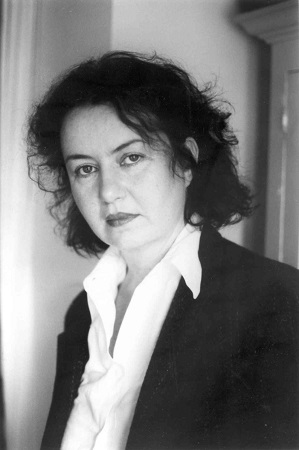Life
| 1959- ; b. Holycross, Co. Tipperary; ed. TCD (grad. in English); further studies at the Sorbonne; winner of scholarship to European Film School at Ebeltoft, 1992; winner of Listowel under-21 writing competition; became freelance journalist; authored a commissioned biography on Countess Markievicz: A Independent Life (1988); also issued a novel, One Day as a Tiger (1997), a tale of genetic engineering in which Martin Hawkins throws over career in TCD and returns to family farm in Tipperary; winner of the Rooney Prize, 1997; issued poems as The Beauty of the Moon (1999); issued The Far Side of A Kiss (2000), a novel telling the story of Sarah Walker whom Hazlitt’s dealt with vengeful in his Libor Amoris; |
| acted as judge in several literary awards incl. Irish Times Literature Prize, 2001; issued The Free and Easy (2006), a novel featuring Tom Blessman, a wealthy young American on safari in Dublin; holds Writer Fellowship at TCD, 2007; she lives in Ranelagh, Dublin, with her husband Anthony Cronin [q.v.; d. 2016]; contrib. to Irish writers’ comments on election of Donald Trump (Irish Times, 10 Nov. 2016); Haverty was chairwoman of An Toscaireacht, the management committee of Aosdána, in 2022. |
 |
 |
| Rose Davidson (Irish Literature) | The Irish Times (in 2022) |
[ top ]
Works| Poetry |
|
| Biography |
|
| Novels |
|
|
| Reviews [among num. others] |
|
[ top ]
Criticism
Interview article, Shirley Kelly, ‘On Sheep and Golden Fleeces’, in Books Ireland (feb. 1996), pp.9-10 [others as infra]; David Wheatley,‘“Impudence! Impudence! Impudence!”: Hazlitt in fFact and Fiction’, No. 1 (Winter 2000/01), q.pp. [review-essay on The Far Side of a Kiss].
See also David Wheatley, ‘“Impudence! Impudence! Impudence!”: Hazlitt in fact and fiction’, Dublin Review, ed. Brendan Barrington, No. 1 (Winter 2000/01) [q.p.; includes remarkson The Far Side of a Kiss.]
₢
Anne le Marquand Hartigan, review of Constance Markievicz in Books ireland (Oct. 1989)
- available at JSTOR - online; accessed 20.08.2023. Click image to enlarge.
[ top ]
Commentary
John Dunne, review of One Day as a Tiger (1997) in Books Ireland (May 1997), p.122; pronounces it a ‘great book’; finds the narrative, dialogue, and descriptions of the countryside perfect.
Eileen Battersby describes The Far Side of a Kiss ([2001]) as being based on Hazlitt’s vengeful Libor Amoris, it presents the story of the writer’s infatuation with the daughter of an inn-keeper from her standpoint, indicating his spite at her rejection of the famous old man; Sarah [Walker] rejected by young lawyer when she is disgraced; Sarah emerges as vain, vulnerable and likeable young girl, Hazlitt as chaotic, vengeful, and pathetic; characterisation called brilliant; called dazzlingly sophisticated performance. (The Irish Times, 16 June 2001, paperback review.)
John Kenny, reviewing of Anne Haverty, The Far Side of a Kiss (2000), The Irish Times [Weekend], 19 Aug. 2000, recounts that the novel concerns an unconsummated and intense 2-year relationship between William Hazlitt and Sarah Walker, dg. of landlord of boarding house where he lodges, ending in his jilting; reviewer quotes Hazlitt’s Liber Amoris (1823), a work that ends in ‘unusually intense high-Romantic dudgeon’. Kenny quotes: ‘She defied anyone to read her thoughts, she once told me. “Do you think they then require concealing?” I imprudently asked her. The command over herself is surprising. She never once betrays herself by any momentary forgetfulness, by any appearance of triumph or superiority to the person who is her dupe [...] it is one faultless, undeviating, consistent consummating piece of acting’. Kenny remarks on finely crafted [writing] that signals a carefully sustained blending of an articulacy that reflects Sarah Walker’s home learning, with a colloquial indignation that reflects her social situation’, further quoting: ‘He has put me in a book. He had but a frail steel nib for his weapon but he has destroyed me by it as clean as if he used a blade and impaled me on its point. There was a time when he calle dme his queen and by other fancy titles and next I am become no more than a juicy bone for him to throw to the scribblers in the newspapers for a right good chew.’ Hazlitt’s Liber Amoris ends, ‘I am afraid she will soon grown common to my imagination as well as worthless to herself.’ He praises the unobstrusive use of history and ‘the empathetic imagination of this splendid piece of writing.’
[ top ]
Quotations
‘A Colourful, Complex, Contrary Fellow’, review of A. C. Grayling, The Quarrel of the Age: The Life and Times of William Hazlitt (London: Weidenfeld & Nicholson [2000]), in The Irish Times (26 Jan. 2001), begins by asking, ‘What does Hazlitt do tohis biographers? .. he elicits from them admiration to th epoint of hagiography and baffling willingness to slide glide over the disturbing aspects of his character … manage[s] to freeze criticism like a vengeful ghost.’; Grayling regards the obsession with Sarah Walker, “lodging-house drudge”, as a seminal episode in Hazlitt;’s life and probably its greatest drama [b]ut his treatment of it is disappointing.’; ‘[…] yet., though he may not have known his own heart, it was at a less personal level indubitably in the right place.’[ top ]
‘A bleak time in Babylon’, review of Peter Brooks, Henry James Goes to Paris, in The Irish Times (12 May 2007): ‘[...] On the face of it, however, he had landed firmly on his feet. Turgenev, a friend made almost immediately on arrival, was warm, hospitable, encouraging - James found him “adorable”. On December 12th, Turgenev brought him along to Flaubert’s Sunday salon in the Faubourg Saint-Honoré, where, apart from the great man himself (who received in his dressing-gown to express the climate of unbuttoned conversation he liked), the gathering included Edmond de Goncourt and the younger novelist, Émile Zola. On following Sundays, James would get to know Guy de Maupassant and Alphonse Daudet. James was aware that he was among the Olympians, but his enthusiasm was qualified. They wanted only to talk about their own books, he wrote home. And their subject matter and expression was “unclean”, “crude”, “foul” ...’
| On the election of Donald Trump |
|
The Irish Times (10 Nov. 2016) - available online. |
| “The Siege of Corona” |
|
| —“Poem of the Week”, in The Irish Times (3 July 2020) - available online; accessed (03.07.2020). |
[ top ]
Notes
Launch: Far Side of a Kiss (2000) was launched on 1 Sept. 2000; Haverty appeared in an Irish Times photograph with Tony Cronin and Noel Pearson, Cronin referring to her as his ‘long-time friend’ in his book-launch address.
[ top ]